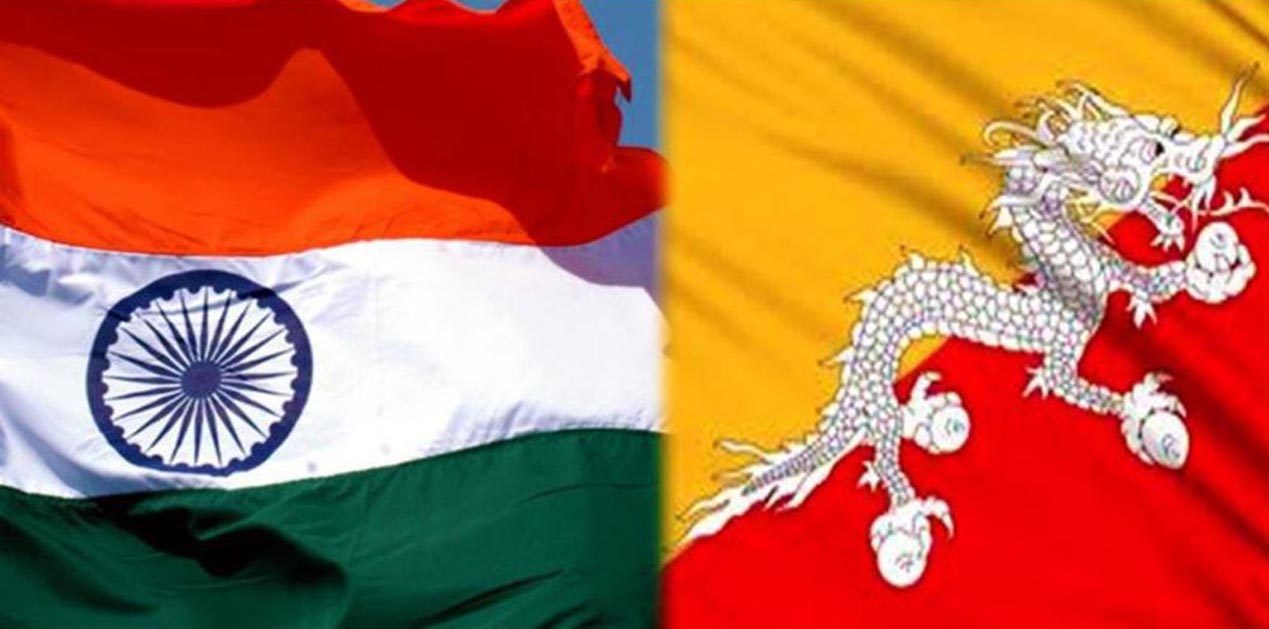India-Bhutan Relations

- 13 Dec 2024
In News:
The December 2023 visit of Bhutan’s King and Queen to India highlights the enduring and strategic partnership between the two nations. Amidst growing Chinese influence and Bhutan’s domestic challenges, the visit holds significant geopolitical relevance, reinforcing India-Bhutan relations and underscoring Bhutan's critical role in India’s regional security.
Reaffirmation of India-Bhutan Relations
The visit reaffirmed the strong, time-tested partnership between India and Bhutan, rooted in mutual trust and cooperation. India reiterated its commitment to Bhutan's socio-economic development, increasing its financial aid for the 2024-2029 period from ?5,000 crore to ?10,000 crore. Notably, Bhutan’s flagship Gelephu Mindfulness City Project, championed by King Jigme Khesar, received strong Indian backing, reflecting India’s willingness to align with Bhutan’s developmental priorities.
Strategic Areas of Cooperation
Clean Energy and Hydropower
Bhutan remains central to India’s renewable energy strategy, particularly in hydropower, a vital part of Bhutan's economy. Bhutan exports the majority of its hydropower to India, reinforcing bilateral ties in the energy sector. This cooperation aligns with India’s regional energy security goals, with both nations seeking to strengthen clean energy initiatives.
Infrastructure Development
The visit also emphasized infrastructure projects, vital for enhancing Bhutan's connectivity. These projects are strategically significant, considering Bhutan's geostrategic importance in the Himalayas. Infrastructure development further strengthens the ties between the two nations, with a focus on mutual benefits and regional stability.
Geopolitical Context: China’s Growing Influence
China-Bhutan Border Disputes
The border issue with China has been ongoing since 1984. In 2023, Bhutan and China signed an agreement to expedite the settlement and demarcation of their borders. China’s push for resolution is part of its broader strategy to reduce India’s influence in Bhutan. The disputed areas, particularly those near India’s Siliguri Corridor, hold strategic importance for New Delhi. Any territorial adjustments could undermine India’s access to its Northeastern states.
Chinese Influence and Economic Engagement
China has been constructing villages along disputed border areas, altering ground realities and establishing civilian hubs that could serve as military outposts. Additionally, China is offering economic incentives to Bhutan, including promoting tourism and investing in Bhutan’s telecom sector, seeking to draw the country into closer economic and diplomatic alignment.
India’s Role in Bhutan’s Security and Sovereignty
Strategic Dependence on India
Bhutan's small military relies heavily on Indian support for training and defense. The 2017 Doklam standoff, where Indian forces intervened to prevent China from constructing a road in disputed territory, underscored India's crucial role in safeguarding Bhutan’s territorial integrity.
Friendship Treaty
The India-Bhutan Friendship Treaty is the cornerstone of their bilateral relations, ensuring Bhutan's sovereignty while reinforcing India's role in Bhutan’s foreign and defense policies. India's increased financial support aims to counter China’s economic influence in Bhutan.
Challenges for Bhutan
Balancing India and China
Bhutan is navigating a delicate balance between preserving its historical ties with India and engaging with China, which offers economic benefits. However, Bhutan’s sovereignty concerns limit its ability to make independent diplomatic decisions.
Domestic Issues
Bhutan faces challenges such as youth migration and limited economic diversification. Over-reliance on hydropower and a lack of industrial development make it vulnerable to external pressures, particularly from China.
The Strategic Importance of Bhutan to India
Geopolitical Buffer
Bhutan's location is vital for India’s security, especially in relation to the Siliguri Corridor, a narrow land link connecting India’s Northeast. Any Chinese presence in Bhutan’s disputed regions could disrupt access to this crucial corridor.
Hydropower Collaboration
Bhutan’s hydropower exports are central to India’s renewable energy strategy, and their cooperation in this area ensures mutual benefits.
Way Forward
India must continue to prioritize Bhutan’s development needs, ensuring robust financial and infrastructural support. Proactive engagement is necessary to address Bhutan’s concerns, particularly in light of China’s growing influence. Additionally, India should support Bhutan’s economic diversification to reduce reliance on external actors.
India's Bhutan Policy: Balancing Regional Allies in the Shadow of Dragon

- 21 Mar 2024
Why is it in the News?
India and Bhutan decided on Wednesday to postpone a state visit by Prime Minister Narendra Modi to Thimphu this week because of bad weather.
Context:
- The planned visit to Bhutan on 21-22 March by the Indian prime minister however had to be postponed due to inclement weather conditions over Paro airport.
- Notwithstanding the sudden intervention by nature, the visit which was otherwise planned amid an electioneering time, showcases the importance that New Delhi is imparting to an important friend and neighbour.
- The importance of Bhutan for India can be immediately gauged from the manner in which China is seeking to woo its southern neighbour away from the ambit of Indian influence.
Background of India-Bhutan Relations:
- India and Bhutan have maintained a special bilateral relationship based on mutual trust, goodwill, and understanding.
- This unique partnership is founded upon the Treaty of Friendship and Cooperation, first signed in 1949 and subsequently renewed in 2007.
- The treaty has provided a strong framework for the two nations to develop close political, economic, and cultural ties.
- A significant aspect of the enduring bond between India and Bhutan lies in their spiritual kinship.
- Bhutan regards India as the "gyagar," acknowledging its role as the sacred birthplace of Buddhism.
- This deep cultural and religious connection has helped foster resilience and camaraderie between the two nations, further cementing their historical friendship.
Why does Bhutan Hold Significant Importance for India?
- India and Bhutan have maintained strong bilateral relations rooted in shared cultural heritage, political cooperation, economic ties, and social connections.
Cultural Bonds:
- Buddhist Heritage: With India being the birthplace of Lord Buddha, Bhutanese monks frequently visit significant Buddhist sites such as Nalanda, Bodh Gaya, and Rajgir, fostering spiritual connections.
- Open Border Policy: The open border encourages regular exchanges of travellers for work, tourism, shopping, and medical care, further strengthening cultural ties.
Political Cooperation:
- High-Level Visits: Frequent political exchanges at the ministerial level, including visits by the Indian Prime Minister and the King of Bhutan, sustain and strengthen bilateral relations.
- Doklam Crisis: During the 2017 crisis, Bhutan granted access to Indian army personnel to resist Chinese incursions, demonstrating mutual trust and cooperation.
- Civilian Award: Bhutan conferred its highest civilian award on Indian Prime Minister Narendra Modi in 2021, recognizing his contributions to the friendship between the two nations.
Economic Partnerships:
- Financial Assistance: India has provided financial aid to Bhutan since the 1960s, supporting its five-year plans, for agriculture, irrigation, health, industrial development, road transport, energy, and education.
- Trade and Commerce: The 1972 Agreement on Trade and Commerce, revised in 2016, promotes free trade, with India being Bhutan's largest trading partner, exceeding $1422 million in bilateral trade in 2021-22.
- Vaccine Maitri Initiative: Bhutan was the first country to receive Indian-made Covishield vaccines, with 550,000 doses gifted during the COVID-19 pandemic.
- Hydropower Collaboration: A vital cooperation area generating significant revenue, hydroelectric projects are covered under a 2006 bilateral agreement, with four operational projects supplying 2136 MW of electricity to India and two more under construction.
Social Connections:
- Education: Approximately 1,000 scholarships are provided annually to Bhutanese students in Indian universities for engineering and medicine, fostering knowledge exchange.
- Indian Diaspora: 50,000 Indians working in Bhutan contribute to fields such as education, arts, and health.
Environmental Importance:
- Carbon-Neutral Commitment: As one of the few countries committed to carbon neutrality, Bhutan has found a key partner in India to achieve this goal through renewable energy, forest conservation, and sustainable tourism initiatives.
New Cooperation Areas:
- Space: Joint development of the India-Bhutan SAT small satellite aims to help manage Bhutan's natural resources, promoting scientific collaboration.
- Fintech: Launching the RuPay Card enables full interoperability, with Bhutan as the second country to launch India's BHIM app for cashless payments.
- E-learning: Integrating Bhutan's DrukRen with India's National Knowledge Network facilitates information access for universities and research institutions in both countries, fostering educational cooperation.
What are the Challenges in India-Bhutan Relations?
- Despite their close ties, India-Bhutan relations face several challenges that must be addressed to maintain a strong partnership.
China's Growing Influence:
- Chinese Presence: China's increasing influence in Bhutan, particularly near the disputed Bhutan-China border, has raised concerns in India, traditionally Bhutan's closest ally.
- While Bhutan and China have not established diplomatic relations, their friendly exchanges can potentially shift the balance of power in the region.
Border Disputes:
- Incidents of Incursions: While the 699 km India-Bhutan border has been largely peaceful, recent incursions by Chinese forces have created flashpoints, such as the 2017 Doklam standoff in the India-China-Bhutan tri-junction.
- Any escalation of these border disputes could strain India-Bhutan relations and challenge their traditional security cooperation.
Hydropower Projects:
- Bhutan's hydropower sector is a key economic pillar, with India playing a significant role in its development.
- However, some Bhutanese have expressed concerns over the perceived disproportionate benefits for India.
- These concerns have led to public opposition in Bhutan against Indian involvement in the sector, which could impact bilateral relations.
Trade Issues:
- Trade Imbalance: India accounts for over 80% of Bhutan's imports and exports, raising concerns about the significant trade deficit.
- Bhutan seeks greater access to the Indian market for its products to reduce the trade deficit, which could require further negotiation and collaboration between the two countries.
- To navigate these challenges, both India and Bhutan must address these concerns through open dialogue, strategic cooperation, and mutually beneficial agreements to maintain their strong and enduring partnership.
Strategies for Strengthening Indo-Bhutan Relations:
- To further enhance the bilateral ties between India and Bhutan, several approaches can be adopted to address potential challenges and promote mutual growth such as:
- Diplomatic Engagement: India should regularly discuss with Bhutan to comprehend its evolving foreign policy objectives and concerns.
- Continual support for Bhutan's sovereignty and development needs is vital to allay any apprehensions of India as a threat.
- Expanded Economic Assistance: India can provide increased economic aid, trade advantages, and infrastructural development to shield Bhutan from succumbing to China's debt-trap tactics.
- Fortifying Defense Collaboration: India should address existing impediments in the relationship and reinforce defence and security cooperation with Bhutan to ensure mutual safety and counter potential Chinese influence effectively.
- Promoting Regional Cooperation: India and Bhutan are members of various regional organizations like SAARC, BIMSTEC, and BBIN.
- Strengthening regional cooperation mechanisms will ensure Bhutan's interests are adequately represented in these forums, enhancing overall regional stability and prosperity.
Conclusion
Bhutan is perhaps one of the most important allies that India has in its neighbourhood. Time has proven its relationship with India. However, recent times have witnessed changing dynamics in the Himalayan kingdom’s polity. Focusing on diplomatic engagement, bolstering economic support, strengthening military ties, and fostering regional cooperation will pave the way for a prosperous and secure future. Also, corrective and course-correction measures that are being undertaken by India to implement its Neighbourhood First policy are laudable.
Key Facts about Bhutan:
- Geography: Nestled between India and China, Bhutan is a landlocked country characterized by majestic mountains and verdant valleys.
- Thimphu is the capital city of Bhutan.
- Political System: Bhutan transitioned to democracy in 2008, following its inaugural democratic elections. The King of Bhutan serves as the Head of State.
- Official Name: Referred to as the 'Kingdom of Bhutan', its Bhutanese name is Druk Gyal Khap, translating to the 'Land of the Thunder Dragon'.
- River: The Manas River, stretching over 376 km, holds the title of Bhutan's longest river. It flows through the Himalayan foothills, forming a transboundary river between southern Bhutan and India.
- Government system: Bhutan follows a parliamentary monarchy system.
- Borders: Bhutan shares borders with only two countries: India and Tibet (an autonomous region of China).
